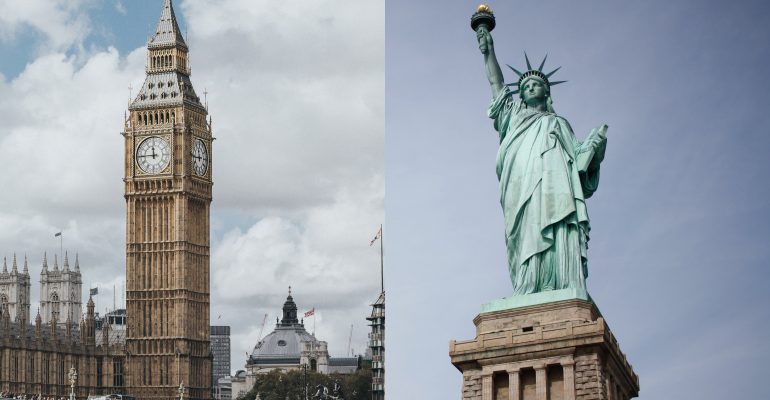When creating any kind of ad, choosing an American voice over vs. a British voice over can make all the difference.
An engaging American voice over can bring a relatable, easy feeling to your commercial, while a British voice can add a touch of class and credibility.
Of course, a truly memorable ad needs multiple elements to make it work.
These include striking visuals, a catchy jingle (maybe), and a compelling script. Voice Crafters’ FREE AI copywriter tool can help you write a professional script that’s spot-on for your needs.
In doing so, it can also guide you towards your decision in whether a British voice actor or an American one would be best suited for it.
However, even before you get to the point, it’s good to have an idea of the strengths—and the potential downsides—each accent can bring to your commercial.
So keep reading! In this guide, we’ll explore both British and American voice overs to help you decide which will be best for your brand and ultimately help you create a winning commercial that your audience will love!
Using an American Voice Over
If you’re creating a commercial for an American audience, your first choice might be to use an American accent.
This is the most intuitive option, but you should think through the pros and cons before making a final decision.
Advantages of Using an American Voice Over
Americans will naturally feel most familiar with an American accent.
And this familiarity doesn’t stop at the level of nationality—it extends to regional accents within the United States.
For example, if you’re targeting an audience in Texas, a southern accent can help establish a stronger connection.
However, you don’t have to use regional accents, and it’s important to be mindful of the associations they carry.
Some, like the Appalachian accent, are often unfairly linked to stereotypes of poverty and lack of education.

American Voice Actor James G.
Others, as discussed in our guide to American accents, may actually be hard for others—including those born and bred in the States—to understand!
In many cases, a neutral American voice over is the best bet. This is an accent defined by its lack of regional features.
In the commercial below, James G. offers a touch of luxury and sophistication while still sounding familiar to most Americans.
A British voice might sound more “classy,” but it could also come across as out of touch or not relatable to the average viewer.
A General American accent can give your ad broad appeal and is therefore a very safe option.
Its lack of regional features and socioeconomic markers means it won’t alienate any listeners.
Disadvantages of Using an American Voice Over
Using a regional American accent can limit the ad’s usage.
Accents are perceived differently by people with different accents.
For instance, as noted above, to some non-Southern Americans, certain Southern accents may sound uneducated.
A Neutral American accent’s lack of socioeconomic markers also means that it won’t evoke an air of sophistication.
Most commercials in the United States feature an American voice.
This means that using one won’t help your commercial stand out from the crowd.
Whether this is a problem for you or not depends on your product/service and the rest of your commercial.
Using a British Voice Over
As with American accents, there is a whole range of British accents.
Everything from Cockney to Newcastle, Scottish to Northern Irish, counts as British.
Yet there’s one British accent that has a great deal of representation in American ads: received pronunciation, or RP.
RP is also known as the Queen’s English and is considered the standard for British English.
So, when should you use this accent?
Advantages of Using a British Voice Over
RP has one distinct advantage over an American voice: it’s very classy.
If you want to create an air of sophistication, nothing can beat sounding like the world’s most famous monarch.
British accents are often used for advertising luxury goods — the Mercedes-Benz commercial below is a perfect example.
The narrator helps associate the brand with elegance and luxury in the mind of the viewer.
It’s an aspirational accent.
Probably one of the most famous “British accents” representing an American brand is insurance company GEICO’s exasperated Gecko who wishes people would stop calling him looking for car insurance!
Initially planned as a fun, one-off commercial, Steve Bassett, group creative director at The Martin Agency, who helped come up with the ad through a focus group, claims:
It became apparent people really liked that character with its British accent and how unusual it was. So, after that first ad ran, we did a couple more. Then we did a couple more and more and more and more.
The decision to keep the British accent, even after shifting from well-known TV actor Kelsey Grammer’s refined tone to the more relatable style of Eastenders British actor Jake Dylan Wood, was about more than likability.
According to the creators, it was simply to make the Gecko sound “smart.”
Aside from insurance and luxury car commercials, British accents are also often used for villains in American films because Americans perceive them as competent, educated, and intelligent.
This means that they’re also perfect for PSAs.
When advertising British brands abroad, using a British voice is also a great idea.
It can lend a company a level of exoticism that they wouldn’t get with an American voice.
It may seem strange (and an unfair bias) that the British accent is considered more suave and cultured than its American counterpart.
But you can’t control the way audiences will perceive different accents and voices. And so, when it comes to advertising, it’s best to go with what works.
Disadvantages of Using a British Voice Over
British voices’ sophisticated air is a double-edged sword to American listeners.
The upper-class sound of Received Pronunciation can mean that it sounds condescending rather than down-to-earth.
If you want to use an accent that sounds like your average viewer, British sophistication may do more harm than good.
The lack of familiarity is another problem to consider.
While Americans can understand what British speakers are saying, most won’t know many people with this kind of accent.
If you’re hoping to cultivate a familial or intimate atmosphere, a British accent could be the wrong choice.
The Middle Ground: A Transatlantic Accent
There is another alternative to both the British accent and the American accent.
This is the Transatlantic voice, also referred to as “Mid-Atlantic” or “International English“.
The Transatlantic accent mixes British and American phonology, resulting in an accent that isn’t distinctly one or the other.
You’re probably most familiar with this accent from classic films. Famous actors with Transatlantic voices include:
Back in the day, this accent allowed American actors to be perceived as being cultured and well-traveled.
This remains true today: using a Transatlantic accent can give your product an air of sophistication and culture without alienating audiences on either side of the Atlantic.
The Transatlantic accent is also very easily understood by non-native speakers.
This means that if you want to advertise your products in areas with a lot of non-native speakers, this accent may be your best bet.
Similarly, if you want to bring back the golden age of cinema or create a sense of nostalgia, this accent will be very useful.
Of course, the Transatlantic accent is no longer used in everyday conversation, so it may be a bit jarring in some contexts.
You’ll have to determine whether it makes sense for the particular project you’re working on.
Finding the Right Voice for Your Commercial
A voice actor’s accent may sound like a relative afterthought, but it’s actually a vital consideration when developing a commercial (or any other content).
You don’t have to decide on a specific accent to look for, but you should at least have an idea of the tone and vocal quality that you want to see in the final product.
Whether you want to use an American voice, a British voice, or a Transatlantic voice, you’ll find the perfect talent at Voice Crafters!
We have a huge selection of pre-screened, professional voice actors from all around the globe.
Use our voice talent search page to find the right voice actor for your project!








0 Comments